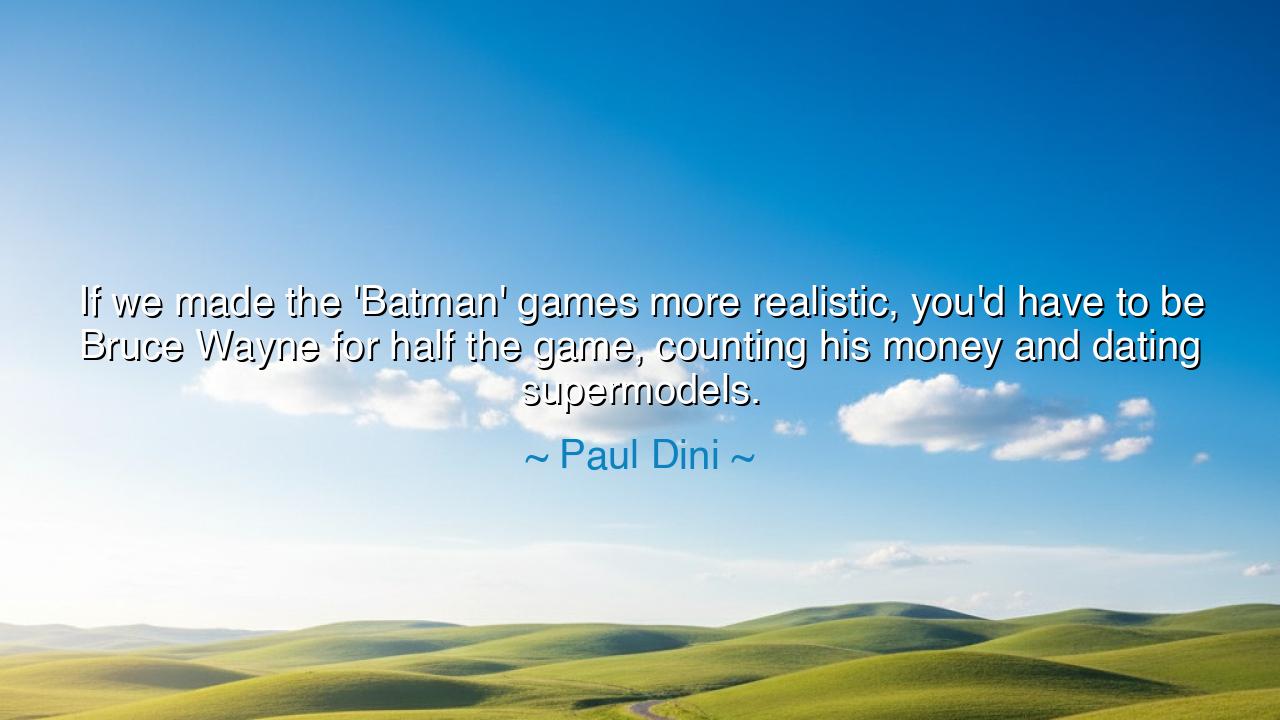
If we made the 'Batman' games more realistic, you'd have to be
If we made the 'Batman' games more realistic, you'd have to be Bruce Wayne for half the game, counting his money and dating supermodels.






The words of Paul Dini — “If we made the ‘Batman’ games more realistic, you’d have to be Bruce Wayne for half the game, counting his money and dating supermodels.” — are delivered in jest, yet behind their humor lies an ancient insight into the duality of human nature. Beneath the laughter, Dini touches upon the eternal tension between appearance and purpose, between luxury and duty, between the mask of comfort and the face of sacrifice. His playful remark, born in the world of modern entertainment, carries the same wisdom that poets and philosophers once wove into their tales: that the hero’s strength is not measured by the ease of his life, but by what he chooses to do with it.
In his jest, Dini reminds us that realism — the surface of truth — is not always the heart of truth. To make a game “realistic,” as he says, would be to dwell in the mundane aspects of wealth and fame, to linger on the trappings of Bruce Wayne, rather than the calling of Batman. Yet the power of Batman has always been symbolic, not literal. He is not admired because he is rich, but because he turns his privilege into purpose. He is the man who, having every comfort the world can offer, walks willingly into darkness to bring light to others. Thus, Dini’s humor conceals a deeper question: what part of us chooses the hero’s path, and what part hides behind the mask of our own comforts?
The origin of this insight rests in the character of Batman himself, born from tragedy and willpower. Created in 1939, amid the shadows of the Great Depression and the dawn of war, Batman was not a god like Superman, but a man who forged his destiny through loss. His story has endured because it reflects the dual nature of humanity — the conflict between our desire for power and our yearning for justice. Bruce Wayne, the billionaire, is the body; Batman, the symbol, is the soul. And Paul Dini, with the irony of a master storyteller, reminds us that if we focused only on the body — on Bruce’s money, luxury, and fame — we would lose the very essence that makes him heroic.
This duality has been reflected throughout history. Consider the tale of King Solomon, the wealthiest of kings, whose wisdom was tested not by his riches, but by his ability to rise above them. Though he built temples and amassed treasures beyond measure, his greatest legacy was his discernment — the capacity to see justice and truth beyond material abundance. Like Bruce Wayne, Solomon was both ruler and seeker, surrounded by opulence yet striving for higher meaning. His life, too, warns us: wealth without purpose leads to emptiness, but wealth harnessed for good becomes sacred.
In Dini’s words, we also hear a warning about the illusion of realism in modern life. The world often celebrates the outer mask — success, fame, appearance — and forgets the inner struggle. Many desire to be Bruce Wayne, but few wish to bear the burden of Batman. To live for pleasure is easy; to live for principle is hard. Yet, as the ancients taught, the soul grows not in comfort but in challenge. The heroic life — whether in fiction or reality — demands sacrifice. To count money and chase beauty may satisfy the body, but to fight injustice feeds the spirit. The true “game” of life is not about luxury, but about the courage to use our gifts in service of others.
And there is, too, a spark of humility in Dini’s humor. By mocking the idea of realism, he acknowledges that art and imagination serve a higher truth than mere imitation of life. The stories we tell — of heroes like Batman — are not meant to show the world as it is, but to remind us of what it could be. Just as the myths of Hercules, Gilgamesh, and King Arthur once taught men to aspire beyond themselves, so too do modern legends like Batman teach us that even the flawed and mortal can rise to greatness. Fiction, then, becomes a mirror of the soul — exaggeration used not for illusion, but for revelation.
The lesson of Dini’s quote, once the laughter fades, is clear: never mistake comfort for purpose, or realism for truth. Each of us carries both Bruce Wayne and Batman within — the one blessed with resources and the other called to responsibility. The challenge of life is to unite them, to use what we have been given not merely for pleasure, but for principle. Let us therefore examine our own “masks” — the roles we play, the wealth or power we hold — and ask whether we serve them, or they serve us.
So, when you hear Paul Dini’s jest, remember the wisdom hidden in its humor. The world does not need more Bruce Waynes counting their fortune; it needs more Batmen — men and women who take what they have, however small, and turn it into good. Wealth, fame, or talent — these are not ends, but instruments. Use them as the hero uses his tools: not for vanity, but for virtue. For in the end, the measure of one’s life is not in the gold one counts, but in the shadows one dares to enter for the sake of the light.






AAdministratorAdministrator
Welcome, honored guests. Please leave a comment, we will respond soon